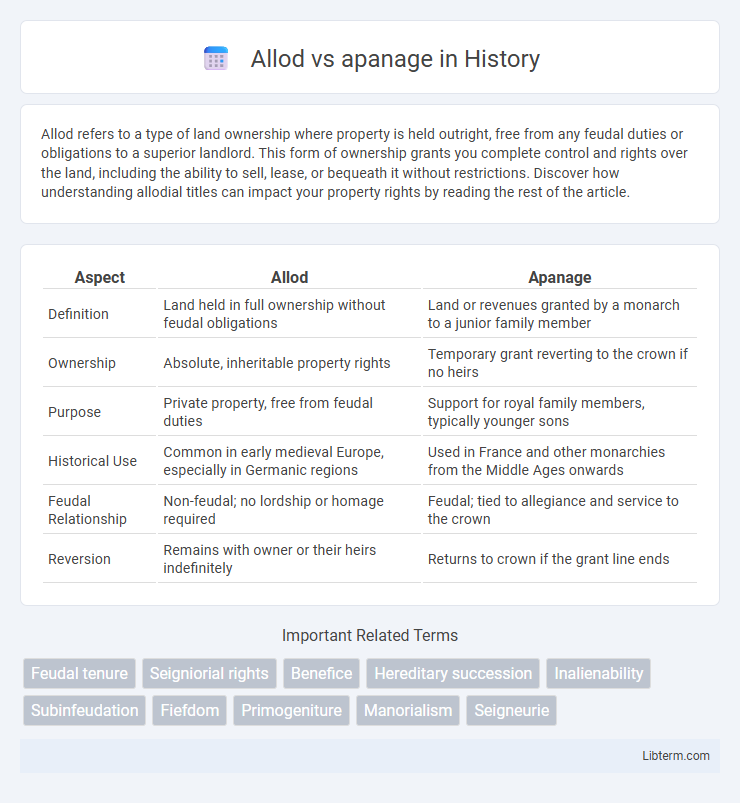Allod refers to a type of land ownership where property is held outright, free from any feudal duties or obligations to a superior landlord. This form of ownership grants you complete control and rights over the land, including the ability to sell, lease, or bequeath it without restrictions. Discover how understanding allodial titles can impact your property rights by reading the rest of the article.
Table of Comparison
| Aspect | Allod | Apanage |
|---|---|---|
| Definition | Land held in full ownership without feudal obligations | Land or revenues granted by a monarch to a junior family member |
| Ownership | Absolute, inheritable property rights | Temporary grant reverting to the crown if no heirs |
| Purpose | Private property, free from feudal duties | Support for royal family members, typically younger sons |
| Historical Use | Common in early medieval Europe, especially in Germanic regions | Used in France and other monarchies from the Middle Ages onwards |
| Feudal Relationship | Non-feudal; no lordship or homage required | Feudal; tied to allegiance and service to the crown |
| Reversion | Remains with owner or their heirs indefinitely | Returns to crown if the grant line ends |
Introduction to Allod and Apanage
Allod refers to land owned outright without obligation to a lord, representing full ownership and hereditary rights in the feudal system. Apanage is a grant of land or revenue given by a monarch to younger children, providing income without ceding full ownership or sovereignty. These distinct forms of land tenure highlight the social and legal frameworks shaping medieval property rights and inheritance practices.
Historical Origins of Allod and Apanage
Allod and apanage represent distinct landholding systems rooted in medieval Europe, with allod originating as fully owned and inheritable property free from feudal duties, commonly observed in Germanic and Celtic regions. Apanage emerged later as a grant of land or revenues by a sovereign to junior royal family members, designed to provide for their status without fragmenting the core royal domain, predominantly seen in the French monarchy. These systems illustrate contrasting approaches to land tenure and royal authority, reflecting evolving feudal and dynastic strategies during the Middle Ages.
Definition and Meaning of Allod
Allod refers to land or property owned outright without any feudal duties or obligations, representing full ownership that is free from lordship or superior claims. In contrast, an apanage is a grant of land or income given by a sovereign to a junior family member, typically tied to hereditary rights and service obligations. Understanding allodial tenure emphasizes absolute possession, distinguishing it from the conditional and service-based nature of an apanage.
Definition and Meaning of Apanage
Apanage refers to a grant of land, titles, or income given by a sovereign to their younger children, especially sons, to provide for their maintenance without dividing the kingdom. It contrasts with allod, which signifies land held in absolute ownership, free from feudal duties or obligations to a lord. The apanage system ensured the younger royal family members had resources and status while maintaining the integrity of the primary inheritance.
Legal Differences Between Allod and Apanage
Allod refers to land owned outright without obligations to a superior authority, granting the holder full legal rights and autonomy over its use and transfer. Apanage is a grant of land or revenue given by a sovereign to a junior family member, which remains under the ultimate control of the crown, often with restrictions on alienation or inheritance. The key legal difference lies in ownership: allodial property denotes absolute ownership free from feudal duties, whereas apanage entails limited ownership subject to sovereign rights and specific succession laws.
Role of Allod in Feudal Society
Allod in feudal society represented land held in absolute ownership, free from obligations to a lord, contrasting with apanage, which was a grant from a sovereign to support royal family members. The role of allod was crucial as it provided independent landholders the ability to exercise full control over their property without feudal duties like military service or rent. This autonomy of allodial landowners often positioned them as influential local powers, shaping the decentralization characteristic of medieval European societies.
Role of Apanage in Royal Succession
Apanage served as a crucial provision in royal succession by granting land or revenue to younger royal family members, ensuring their maintenance without dividing the core realm. Unlike allodial holdings, which were independently owned without feudal obligations, apanages remained under the crown's ultimate authority, preserving the unity of the kingdom. This system helped prevent succession disputes and reinforced centralized control while supporting cadet branches within the monarchy.
Advantages and Disadvantages of Allod
Allod refers to land owned outright without any feudal obligations, offering owners complete control and freedom to sell, lease, or bequeath property without interference. This absolute ownership advantage contrasts with apanage, which is granted by a sovereign and often entails certain duties or limitations, linking land tenure to service or allegiance. However, allodial land can be vulnerable to challenges in legal recognition or state taxation, and lacks the protective framework that may come with feudal ties in apanage systems.
Advantages and Disadvantages of Apanage
Apanage grants a portion of land or revenue to junior royals without full sovereignty, enabling economic support but risking fragmentation of a kingdom's authority. Advantages include securing loyalty of family members and providing financial independence, reducing internal strife over succession. Disadvantages involve potential dilution of centralized power, fostering semi-autonomous regions that may challenge the monarch's control over time.
Lasting Impact of Allod and Apanage in Modern Law
Allod and apanage systems shaped property rights by establishing permanent ownership in allodial lands and conditional, often hereditary, grants under apanage. The lasting impact of allod lies in its influence on modern freehold property, emphasizing absolute ownership, while apanage contributed to legal frameworks managing territorial grants and inheritance restrictions. Contemporary land tenure and succession laws reflect these historical concepts by balancing individual property rights with state or familial obligations.
Allod Infographic

 libterm.com
libterm.com